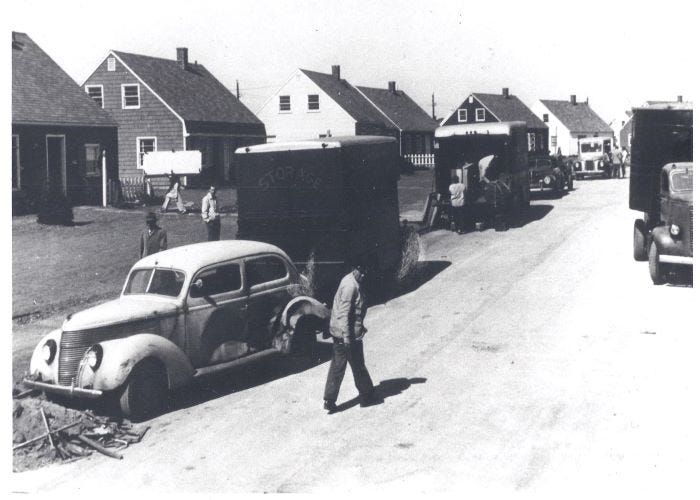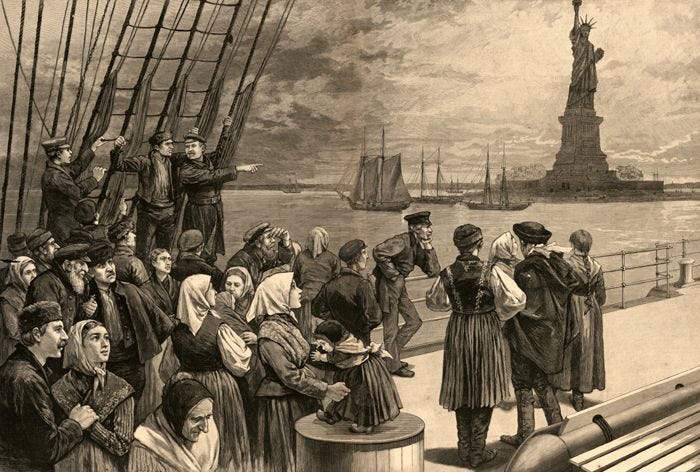How Dare You?
A different perspective on the American Dream
All I wanted was a cup of coffee. Less than a minute inside Bruegger’s, I realized the odds weren’t good. Three dozen people stood on line. As my brain tried to process why it was so busy in downtown Pittsburgh on a Saturday morning, I noticed some of the people carried stuffed animal backpacks and others wore fuzzy cartoon animal costumes. “Oh right,” I nodded to myself. “It’s Anthrocon weekend.”
The summer I moved back home, after twenty-five years of living in other places, my mom and I drove into town to see a play. Without warning, she rolled down the window and tapped me repeatedly on the arm. “Beep the horn!” When I looked over toward her, I saw three people walking down Sixth Avenue wearing costumes that transformed them into animals, complete with tails.
My first thought was, “God, that’s got to be hot.” The second was, “What the hell is happening?
My mom leaned out the window and I reluctantly beeped the horn. “Welcome to Pittsburgh!” she shouted as we drove past. Then she rolled up the window and turned to me wearing a smile as bright as a spotlight. “They’re furries!” she said. Her tone implied I should understand what this meant. I raised an eyebrow and shook my head. “They’re in town for Anthrocon.”
At the site of stuffed animals come to life, my mother’s energy became that of an excited little girl. She explained that the convention was for fans of anthropomorphic characters from books and movies, and that many enjoyed dressing up like them. While I listened, I noticed dozens of other people strolling through downtown on this blistering summer day, covered in fake fur. Pedestrians passed by them without a second glance.
Somewhere during the conversation, an old Dan Savage column I’d read popped into my mind. It was about people who liked to dress up in fur costumes and have sex. I shared this with her. She set her chin, as only mothers can, and said, “If people want to dress up as dogs and tigers and have sex, who cares? They’re having fun and doing something that brings them joy. That makes me happy.”
Six years later, I really wanted coffee but there was no way I was standing on that line. I decided to sit down to see if I could wait it out. Almost all the tables around me were occupied and more furries kept appearing from the adjoining hotel like clowns from a Volkswagen. There was a Starbucks around the corner, but it was surely just as packed. It didn’t look good that I’d get my caffeine fix.
Someone sidled past my table with a baby strapped to their chest in a BabyBjörn carrier. My mind, conditioned by decades of American culture, assumed it was the mother. This assumption was supported by the fact that the parent wore a knee-length pink tutu along with a turquoise satin purse that hung from a long gold chain.
I like to think I’m open-minded. But I’d be a liar if I said I didn’t have to hide my surprise when this person turned around and it was clear he was a he. Then someone wearing jean shorts and work boots approached, lifted the baby’s hand and kissed it. Although her breasts appeared to be bound beneath a loose-fitting t-shirt, she was female, and again my self-congratulating label of “open-minded” was tested.
Although this couple was not dressed in a way society would label normal, they seemed at home in this downtown coffee shop. They smiled at each other and cooed at the baby as they ate their bagels. The baby giggled, and they reached across the table to hold hands.
Not wanting to stare, I turned my attention to a large group in a variety of costumes that were now waiting on line – a line where some had been standing for fifteen minutes or more. Each group had its own look. Some were in full cartoon animal regalia. There were a couple of pandas, several leopards, two tigers and a unicorn. Three of them were dressed like Josie and the Pussycats and even carried fake electric guitars.
There were anime animals I didn’t recognize, a Tigger and one man with a tail sprouting from the rear of his jeans toting a giant furry horse head. Others wore street clothes along with animal ears attached to headbands.
The staff worked hard to move people through, but it didn’t seem as if anyone cared how long it took. They chatted and laughed, not an iota of irritation anywhere. Three large men dressed identically in navy blue Chinos and matching work shorts stomped by my table in enormous rubber dinosaur feet. They each carried a large T-rex head.
I didn’t even miss the coffee while I watched my own personal furry parade.
When I noticed the time on my phone, I realized I had to go and felt a little sad to be leaving a party I wasn’t even invited to. As I walked to the car, a character I created for an improv project popped into my head and began to share her thoughts on what I’d experienced.
Skeeter Reynolds is what Pittsburghers call a “yinzer.” She was born and raised in this once-thriving steel town and her father worked in the mill his whole life before he died of cancer. Her mother is in her late 70s and in poor health, so Skeeter lives with her. She works for a local municipality in a low-level job since her education ends with a high school diploma.
“How dare you?” Skeeter hissed in my mind. “How dare they not give a shit what anyone thinks?”
I was stunned but wanted to know more. “What bothers you about that?” I asked. Her response was chilling.
“I was supposed to be off today but here I am, on my way to work. To a shitty job I hate. On a Saturday. Because someone called in sick. Hungover is probably more like it. All I wanted to do was watch the baseball game and have a few beers. Is that too much to ask?"
“Every night this week – after I spent eight hours, or more, every day cleaning out storm drains, holding traffic signs in 90 degrees while the guys filled potholes, and crawling into air ducts to find mice – I had to run my mom around. The grocery store, the pharmacy, the friggin Dollar General. All I wanted to after work was kick back and watch the Pirates with a few beers.
“But I did it. You know why? Cause I am a good daughter. I handle my business no matter what. Not like these freaks, bein’ out in public like this, bendin’ genders. Come on now. What the hell? Who’s got time for that? I got responsibilities. Cuttin’ grass. Workin’. Putting up with idiots on the job. Payin’ bills.” She paused for a breath.
“They’re out here spendin’ money on clothes and costumes that make them look ridiculous. And bringing their kids! Teachin’ ‘em it’s ok to be a freak! That ain’t my American dream. Do what’s right. Honor thy father and mother. No worshippin’ false idols n’at. Adults dressin’ up as unicorns. My daddy’s spinnin’ in his grave.”
I let Skeeter’s tirade sink in. Then it hit me.
She’s one of millions who bought into and still believes the 20th century version of the great “American Dream.” The original dream sprouted from seeds of truth – examples of immigrants like Albert Einstein and Levi Strauss come to mind. Then it mutated, like GMO produce. People like railroad developer Jason Gould notoriously built his wealth on the backs of his labor force and shared with them just enough of the fruits of their labor to keep them coming back, to keep them believing in the dream.
The original perception that America was the land of streets paved with gold came from immigrants coming from countries with fewer opportunities. In reality, however, it was mostly a fallacy, a great hope corrupted by the worst of capitalism. But that didn’t mean people didn’t keep hoping that if they worked hard enough, they could have all the fruits from their labor.
Many factors helped to both bastardize and perpetrate the “American Dream” rhetoric, but the event that had the biggest impact started out as well-intentioned legislation. The GI Bill, designed to provide college educations, extended unemployment insurance and housing for veterans of World War II, became a meaty carcass for the greedy vultures who replaced cooperation, one of capitalism’s most socially valuable components, with greed.
After eight million vets returned home. the population soared. The GI Bill and post-war prosperity meant growing families wanted to get out of concrete jungles. They flocked to developing suburbs in droves. Places like Levittown, probably the best-known example of the lure to burbs, were planned communities. The original Edward Scissorhands Land.
Abraham Levitt and his sons works hard to press politicians to rewrite zoning laws for their first development on Long Island. The original community cost $50 million to develop and was carefully constructed to appeal to those who wanted that American Dream, or at least more than what their parents had.
Every front yard had a white picket fence and two trees, planted the exact same distance apart. Each house, manufactured on an assembly line, sat on one-seventh of an acre, contained the same square footage with two bedrooms and no garage. And every house came with a television (the better to see ads with) and a full set of appliances – refrigerator, washer, dryer, dishwasher, stove.
In the first three hours after going on the market, 1400 homes were purchased. Seven of these developments were eventually built, anchoring the golden age of advertising, a necessary tool for perpetrating the mutated lie of the American Dream.
Before this some people tried to “keep up with the Jones’s.” But now, with advertising saying exactly was necessary for success, to be on top, respected and accepted, the message was pervasive. And it all included stuff. Moms wanted the latest appliances, furniture and linens. Kids had to have the trendiest clothes and shoes. Dads longed for the coolest cars, golf clubs and tools.
Skeeter was no different.
Manufactured and sold to us by Madison Avenue, which at the time was comprised solely of white men, the discourse of the 50s is a huge factor in our current climate. It’s only been recently that I can honestly say the last of the residue from this belief system has evaporated in my own life and I’ve been working on it since I walked away from my last corporate job twenty-five years ago. It engages the mind not the soul and its roots are deep. It’s also a huge part of why the United States is where it is.
Believing the America Dream story, which has been perverted by the toxic virus of crony capitalism, has created two types of citizens: Those who are focused on what they don’t have and feel gipped. And those who’ve attained some version of the Dream and are terrified it will be taken away. The one thing they both have in common is fear of not having enough.
It’s as if the ghosts of European ancestors who immigrated to America because of starvation and poverty in their home countries float in the ethers of America, serving as harbinger that’s really nothing but the past. “You’ll lose everything if you don’t stake your claim,” they whisper. “There’s never enough to go around.” The resulting behavior from believing their narrative looks completely insane to someone who strives to live a life where ego is acknowledged but not in charge.
Those who still long to have The Dream go to church on Sunday, hopeless at their core, to pray for a spark that will resurrect that hope. The raw hatred that emanates from those working hard to do what they believe they must to get their share of The Dream is horrifying.
For those who have managed to achieve a portion of The Dream, the fear of it being “taken” is pervasive. They pray to their God that the “hard earned” winnings will stay theirs. There is zero recognition of the access or advantages that supported their result, just an all-consuming terror that it could be taken away. Their hate is no less impactful; their arguments just look different.
Instead of MAGA hats and stiff middle fingers, their fear is more refined, disguised as concern for the country expressed over Scotch and hors d oeuvres. The anger and resentment about what is perceived as a threat to the Madison Avenue-created illusion has birthed a divisiveness not seen in this country since the Civil War.
These two extremes are squeezing the very breath out of our country. Instead of asking, “How can we be better? How can we include people who seek to escape the same type of oppression our ancestors did?” we have allowed ourselves to be divided and conquered by mostly mediocre greedy white men whose only mission is to rule the world.
We forget that on the world stage, the United States is a teenager. And this is how teenagers, particularly male teenagers, behave. It’s all about let me keep what I have while acquiring more. The fear has penetrated the heart of our country. It’s a tragedy that no one in power can imagine a different dream.
Skeeter’s words helped me to realize that the issue that must be addressed is the fear, not the politics. Not the president. But how do you get someone to admit they’re scared when they are so engaged in hate? There is no parent to guide us.
I don’t have the answer. Perhaps if more of us start asking the question, one – or possible more – will show itself.
~~~~~~~~~~~~~~~~~~~~~~~~~~~~~~~~~~~~~~~~~~~~~~~~~~~~~~~~~~~~~~~~~~~
If you’re looking for fun laptop stickers like the one below, check out the Mosaic Platypus Shop on TeePublic!






